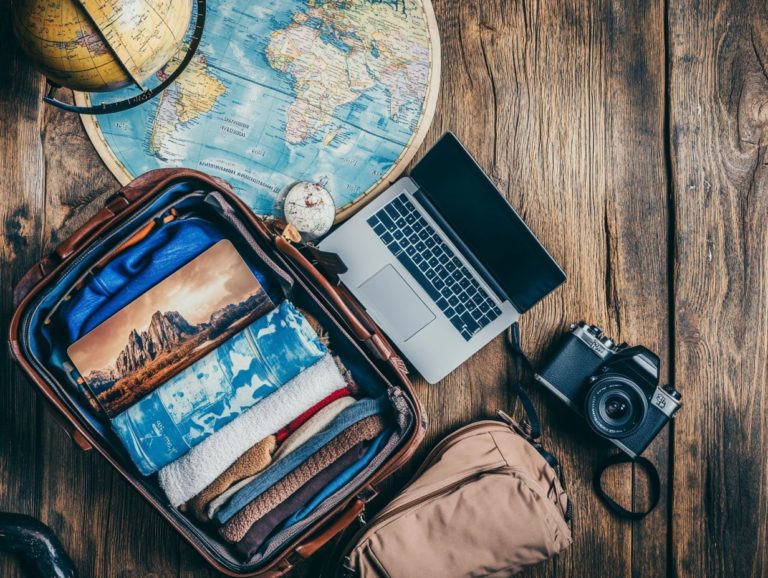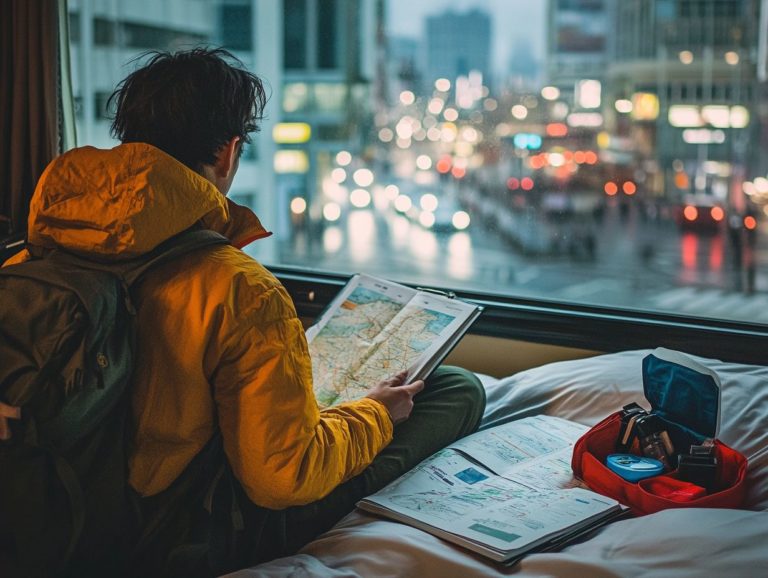How to Stay Healthy While Abroad?
Traveling can be an exhilarating experience, yet it also brings unique challenges to your health and well-being.
From navigating vaccinations and medications to managing the local cuisine, staying healthy while abroad demands careful planning. This article provides practical tips to prepare for your journey, including essential insurance details and emergency contacts to have on hand.
You’ll uncover ways to maintain a balanced diet, stay active, and support your mental health while embracing new cultures.
Get ready to embark on your adventure with these vital health tips that guarantee unforgettable travels!
Contents
Key Takeaways:
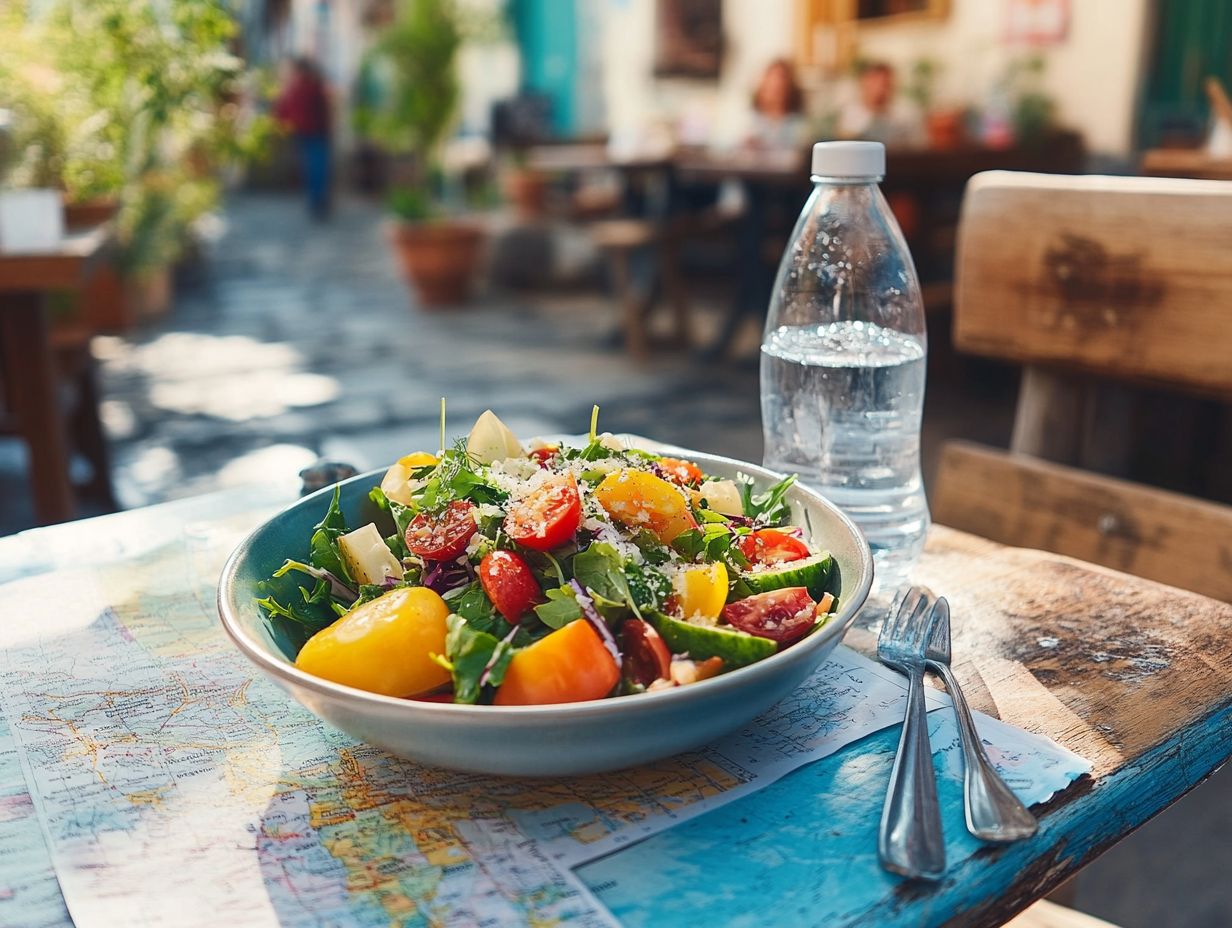
- Research and obtain necessary vaccinations and medications before traveling abroad to prevent illness.
- Prioritize hydration and choose wisely when trying local cuisine to avoid food poisoning.
- Make time for physical activity and adjust to a new time zone to stay active and combat jet lag.
- Stay mindful of mental health by preparing for culture shock, managing stress, and staying connected to loved ones back home.
Preparations for Healthy Travel
To stay safe, make sure you’re fully equipped with the right vaccinations and medications to reduce health risks associated with air travel. Familiarize yourself with the necessary immunizations relevant to your destination, especially in light of COVID-19.
Pack essential medications for any ailments that might crop up during your trip. Having comprehensive travel insurance and a well-prepared list of emergency contacts is also critical for navigating unexpected health challenges while abroad.
Vaccinations and Medications
Before you embark on your journey, it’s essential to consult with a healthcare provider about the necessary vaccinations and medications tailored to your specific travel destination.
Regions like Southeast Asia may require vaccinations for diseases such as hepatitis A and typhoid. Travelers to Africa often need to consider vaccines for yellow fever and medications to prevent malaria. Depending on where you’re headed, carry essential medications, including melatonin to help regulate your sleep patterns during long journeys, as well as any personal prescriptions you may need.
Assembling a comprehensive first-aid kit is crucial for addressing minor injuries or illnesses that might crop up while traveling. Be sure to include items like:
- Antiseptic
- Bandages
- Over-the-counter pain relievers
This preparation ensures you re well-equipped for unexpected situations, leading to a healthier and more enjoyable travel experience.
Insurance and Emergency Contacts
Having robust travel insurance and easily accessible emergency contacts can significantly elevate your travel experience, providing you with peace of mind in the face of unexpected events.
Consider the various types of travel insurance available, such as medical, trip cancellation, and baggage insurance each designed to cater to your specific needs. Medical coverage is crucial for emergencies abroad, ensuring you can receive prompt treatment without the burden of exorbitant costs.
Compile a list of local emergency contacts, including nearby hospitals and consulates. By proactively addressing these elements, you not only safeguard your well-being but also enhance your overall adventure, allowing you to focus on creating memorable experiences instead of worrying about potential pitfalls.
Eating Well While Abroad
Eating well while traveling is vital for sustaining your energy levels and overall health, so approach local cuisine with both curiosity and knowledge. In addition to enjoying local foods, it’s important to consider how to stay safe as a student abroad. Seek out nutrient-dense snacks like nuts and fresh fruits, which are packed with essential vitamins such as Vitamin C and Vitamin D to strengthen your immune system.
Prioritizing hydration through drinking water and including moisture-rich foods can significantly reduce the risk of food poisoning, ensuring that your culinary adventures remain both safe and enjoyable.
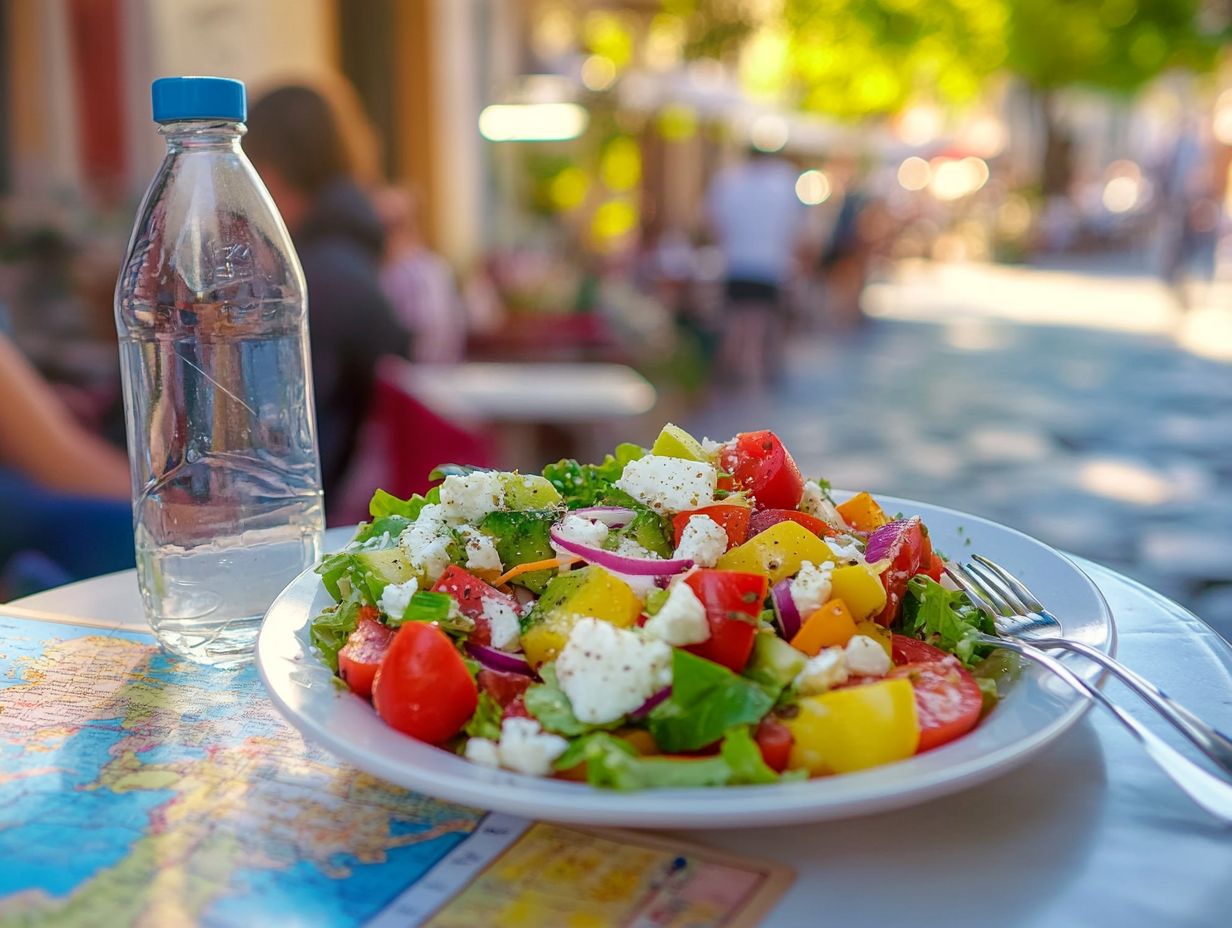
Navigating local cuisine can be an exquisite adventure. It’s essential to understand food safety practices to ensure your dining experience is remarkable.
When choosing a place to eat, look for establishments that focus on hygiene. Those with excellent food safety inspection ratings are your best bets.
Read reviews from fellow travelers to gain insights into the quality of dishes and the overall cleanliness of the venue.
Embracing local dishes deepens your cultural immersion and supports fresh, seasonal ingredients. Choose meals rich in fruits and vegetables, and don’t hesitate to ask about cooking methods to avoid excessive oils.
Remember, savoring local flavors while prioritizing food safety turns a simple meal into an unforgettable food experience.
Staying Hydrated and Avoiding Food Poisoning
Staying hydrated is key during your travels. It’s not just about drinking water; choose foods like juicy fruits and crisp vegetables that help keep you hydrated.
Be mindful of signs of food poisoning, which can come from unfamiliar local cuisines. To enjoy local food safely, choose freshly prepared meals and wash fruits and vegetables thoroughly.
Balancing your water intake with hydration-rich snacks will help maintain your energy levels and overall health.
Staying Active and Fit While Abroad
Staying active and fit while traveling boosts your well-being and reduces jet lag. This transforms your travel experience into something enjoyable and stress-free.
During flights, incorporate light exercises like stretching and deep breathing to improve your circulation. Plan daily activities that involve walking, hiking, or local fitness classes to keep your energy up.
This dedication to fitness helps you fully enjoy all the adventures that travel offers!
Finding Exercise Opportunities
Finding exercise opportunities while traveling enhances your physical and mental well-being. It allows you to engage actively with your destination.
Look for local amenities like vibrant parks, well-equipped gyms, and fun fitness classes to add physical activity to your travel plans. Many cities offer outdoor yoga sessions and inviting walking trails for leisurely exploration.
Using hotel fitness centers or downloading fitness apps helps you maintain your routine anywhere. Embracing your surroundings keeps you fit and connects you to the local culture, making each travel experience richer.
Dealing with Jet Lag
Jet lag can disrupt your travel experience. Prioritize sleep and use strategies to reduce its effects.
Crossing multiple time zones makes it hard for your body to adjust, leading to fatigue, headaches, and irritability. Try meditation apps like Insight Timer for calming music and guided sessions that ease you into relaxation.
Natural sleep aids like melatonin help regulate your sleep patterns. Staying hydrated is vital; avoid heavy meals close to bedtime, and gradually adapt to the new schedule before your journey for a smoother transition.
By applying these travel health tips, you ensure a more enjoyable journey ahead!
Maintaining Mental Health While Abroad
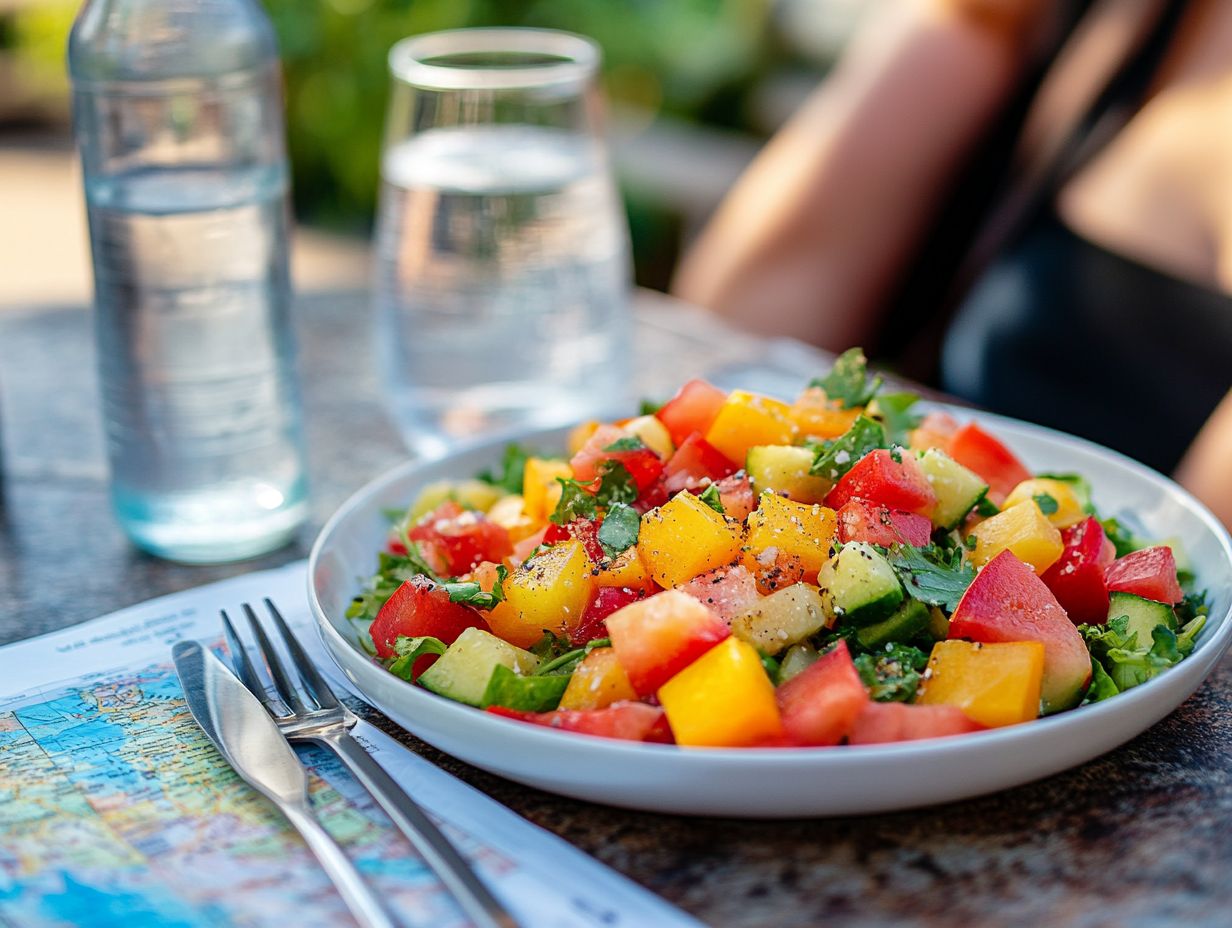
Maintaining your mental health while traveling is often an afterthought. Yet, it is essential for ensuring a fulfilling and enjoyable experience. Travel can introduce a range of stressors, from culture shock to feelings of homesickness.
To handle these challenges, you must develop coping strategies that build resilience and emotional well-being. Consider incorporating techniques like deep breathing exercises into your routine and tapping into valuable resources that can support your journey.
Coping with Culture Shock
Culture shock can pose a significant challenge for you as a traveler. It often surfaces as feelings of disorientation or frustration when encountering unfamiliar customs and practices.
This experience typically unfolds in distinct stages. It begins with the thrill of new adventures, followed by that inevitable adjustment phase, where stress and confusion may creep in. Understanding these phases is key to handling the challenges that arise.
To cope, you must maintain open communication, build a supportive network, and practice mindfulness to enhance your mental well-being.
Embracing simple travel tips like keeping a journal or engaging with locals can enrich your journey and alleviate feelings of isolation. By prioritizing your mental health during this process, you not only elevate your travel experience but also foster personal growth as you immerse yourself in diverse cultures.
Managing Stress and Homesickness
Managing stress and homesickness is essential for you as a traveler. The new environment can feel isolating or overwhelming.
By incorporating techniques like mindfulness practices think meditation or deep-breathing exercises you can build a sense of calm, even amidst the hustle and bustle of unfamiliar cities or cultures.
Staying connected with loved ones through regular video calls or messages can alleviate feelings of loneliness. This helps create a support system that transcends distance.
Engaging in these strategies boosts your personal resilience and significantly enhances your overall mental well-being as you explore new places. By being mindful and maintaining your relationships, you allow yourself a more enriching travel experience. This enables you to fully immerse yourself in the adventure without the shadows of stress hanging overhead.
Frequently Asked Questions
1. How can I stay healthy while abroad?
Staying healthy while traveling abroad may seem challenging, but it is possible with the right precautions. For more insights, check out this guide on how to stay healthy while traveling abroad. Here are some tips: get vaccinated, eat well-balanced meals, stay hydrated, and practice good hygiene. Try to find local markets for fresh produce.
2. What vaccinations do I need to stay healthy while abroad?
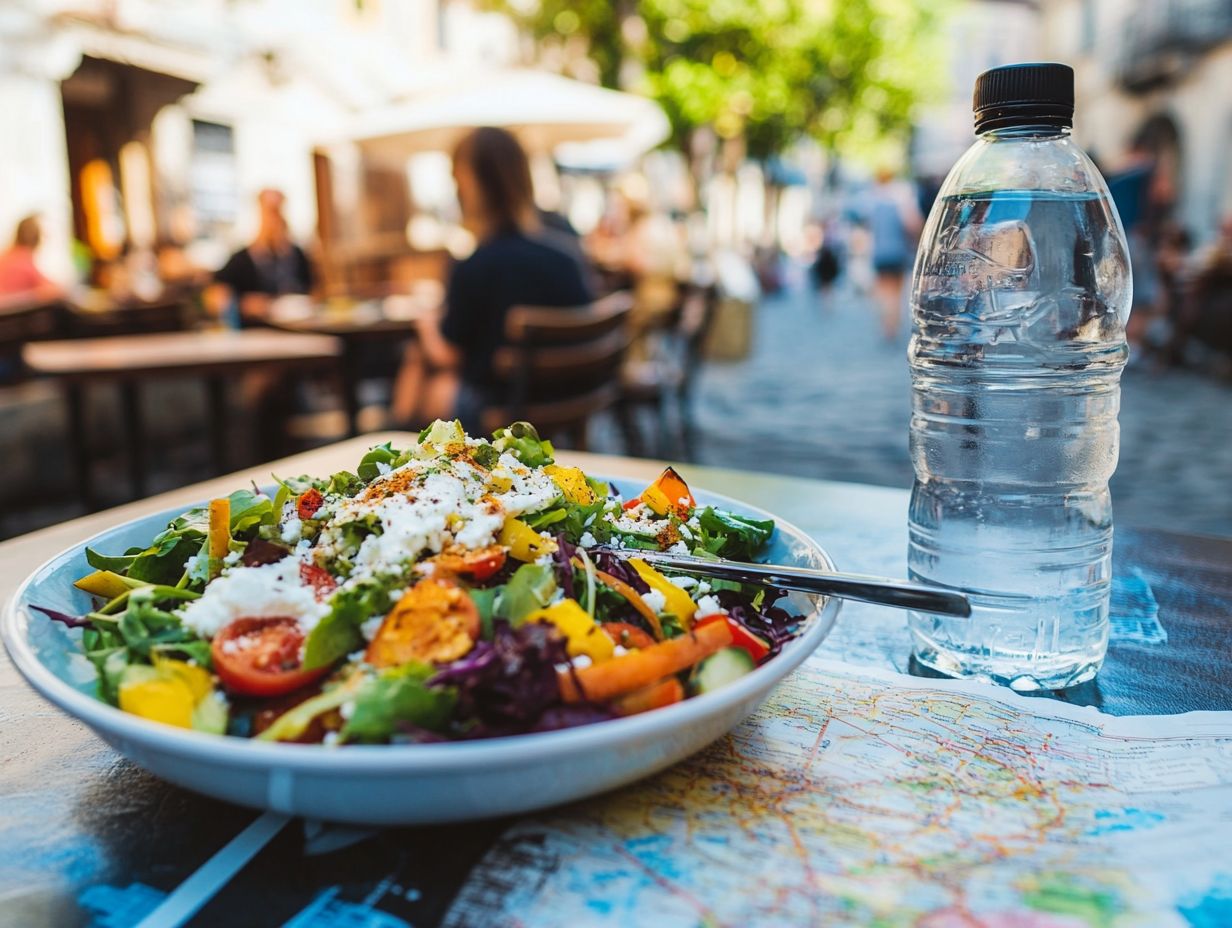
The vaccinations you will need depend on your destination, the length of your trip, and your current health. Don’t forget to check in with your healthcare provider at least 4-6 weeks before your trip to ensure you are up-to-date on all necessary vaccinations.
3. How can I maintain a healthy diet while traveling abroad?
Eating a well-balanced diet is essential for staying healthy while abroad. Additionally, it’s important to consider how to stay safe while studying abroad. Research local restaurants and grocery stores before your trip to find healthy options. Pack non-perishable snacks to have on hand, and aim to incorporate fruits and vegetables into your meals.
4. How do I avoid getting sick while traveling abroad?
To avoid getting sick while traveling abroad, it is important to practice good hygiene. This includes frequently washing your hands, avoiding touching your face, and using hand sanitizer. Be cautious of consuming contaminated food or water, and if you do fall ill, knowing what to do if you get sick abroad can be incredibly helpful. Consider using a water purifier or drinking bottled water as preventive measures.
5. Is it safe to exercise while abroad?
Exercising while abroad can be a great way to stay healthy and maintain your fitness routine. To keep your motivation high, consider exploring how to stay inspired while abroad. However, take precautions and research safe areas to exercise in, especially if you are traveling alone. Listen to your body and adjust your workout intensity to accommodate any jet lag or fatigue.
6. What should I do if I get sick while abroad?
If you get sick while abroad, seek medical attention right away. Research local hospitals or clinics in advance.
Keep a list of emergency contacts and have your insurance information handy. Don’t wait! Get the medical help you need as soon as possible.
Traveling can be unpredictable, so always be prepared!




